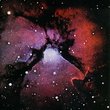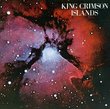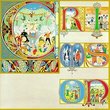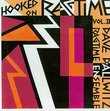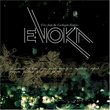| All Artists: King Crimson Title: Larks Tongues in Aspic Members Wishing: 4 Total Copies: 0 Release Date: 4/1/2008 Album Type: Import Genres: Rock, Classic Rock Styles: Progressive, Progressive Rock, Album-Oriented Rock (AOR) Number of Discs: 1 SwapaCD Credits: 1 |
Search - King Crimson :: Larks Tongues in Aspic
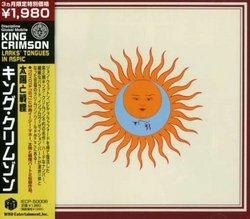 | King Crimson Larks Tongues in Aspic Genres: Rock, Classic Rock
British prog group's 1973. Six tracks including 'The Talking Drum'. Standard Jewelcase. |
Larger Image |
CD DetailsSynopsis
Album Description British prog group's 1973. Six tracks including 'The Talking Drum'. Standard Jewelcase. Similar CDs
|
CD ReviewsMy favorite CD ever larkstung | hitsville, USA | 02/27/2006 (5 out of 5 stars) "I have thousands of Compact Discs, I am huge Beatles fan, I love Neil Young and I wish that God had saved the Kinks. But this is the record I have listened to the most in the past 33 years. A lot of my friends and family consider this to be noise. That may be true, but if so, it is beautifully orchestrated and executed noise." A Classic in any genre of music. M. Coller | Garden of Eden | 04/02/2006 (5 out of 5 stars) "Too often bands in the 70's were tagged with names like 'supergroup', 'prog','heavy metal'etc etc. King Crimson had already been through all that and thier masterpiece debut, In The Court of The Crimson King, they arguably redifined an area of music which was only later to be called Progessive Rock. KC were as experimental as any other band from that era. But after 4 albums and constant personell changes their tallisman Robert Fripp assembled a line up featuring a violinist and two percussionists.Add to this the agressive bass and Greg Lake style vocals of John Wetton (how far was this music from Asia John?)and the new KC was born and bore very little resemblance to not only the previous line ups but sounded like no other band on the planet. To achieve such a unique style was an archivement in itself, to produce an equally unique album was even greater. Starting with the longest intro you'll hear to the last coda fading of Fripp's Bible Black Gibson, this album frightens with its intense change of moods and surprises with its serenity. You could almost hear it as a future soundtrack to modern Hitchcock. After 30 years it stands up not only in terms of production but in the quality of the playing by five musicians challanging themselves and the listener. This line up, minus one, went on to make two more excellent albums but Crimson never sounded as original as this again or before.To think this was 4 years after the groundbreaking debut that took some doing!" Amazing, hammering, intense (but inaccessible!) rock Andreas | USA | 03/27/2006 (5 out of 5 stars) "Wow. This one might take a lot of listens to be comfortable with, but it's definitely worth the effort. In 1972, Robert Fripp must have decided he'd had enough of "Islands"-style directionless classical-rock noodling/cacophony, because "Larks' Tongues", recorded with a completely new band of highly professional musicians, is focused and hard-hitting. Former Yes drummer Bill Bruford really widens his scope on "Larks'" and plays like he never had before, John Wetton contributes his cool voice and great bass playing, violinist David Cross brings in an unexpected but effective element to the music, and mad percussionist Jamie Muir bangs and rattles away on everything in the studio that he can hit.
Of course, at the center of the band stands Robert Fripp, who tears up "Larks' Tongues In Aspic Parts One and Two" with the guitar he seemed to have forgotten about since recording "In The Wake Of Poseidon". The title track instrumentals are terrifically threatening, and although they might sound like random improv at first listen, they are actually well-constructed pieces. "The Talking Drum", which leads into "Larks' Tongues Part Two", is probably my favorite of the album; slowly building from a quiet drum-beat to a raging rocker with Bruford and Wetton holding down the piece, Fripp ripping away with his riffs and Cross swooping about with his violin. The remaining three tracks are actual songs, albeit with much jamming included. "Exiles" is a beautiful ballad, and while John Wetton can't beat Greg Lake at belting out such epic lines (but who can beat Greg Lake at this style?), he gives a great performance anyway. The playing is excellent as well. "Easy Money" steers more into rocking territory, with some aggressive vocals and a long mid-song guitar-led jam that doesn't get boring for one second (I especially like the part around 6:02 or so, although I couldn't tell you why.) I can't forget to mention the funny sound effects throughout the song, which I guess are courtesy of Jamie Muir. Finally, "Book Of Saturday" is really quiet and unremarkable when compared with the rest of the album, but it's a nice ballad in any case. Despite all my praise, this really shouldn't be your first King Crimson record. One album reviewing website called "Larks' Tongues" "unfriendly music", and I don't think there's a better description for it. This album is cold, inaccessible and not inviting at all. You'd better go for "In The Court Of The Crimson King" or maybe "Red" first if you're not familiar with the band. If you find yourself loving these albums, however, don't hesitate to get this one. Listening to "Larks' Tongues In Aspic" is quite a jarring experience, even after a hundred spins." |

 Track Listings (6) - Disc #1
Track Listings (6) - Disc #1